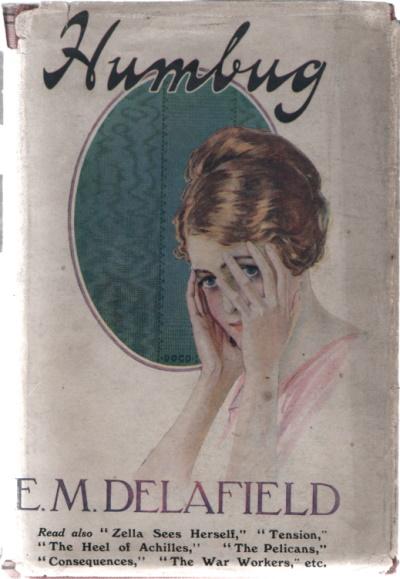 Cover of the third edition.
Cover of the third edition.
Book Review by G.S.: Humbug is a very good novel, yet another reminder that there is more to E.M. Delafield than the Provincial Lady ( excellent as that is).
Like many of her novels of the early twenties, it is an impassioned plea for honesty.
It begins with the splendid sentence:
Good women know by instinct that the younger generation, more especially when nearly related to themselves, should be equipped to encounter life by the careful and systematic misrepresentation of the more vital aspects of life.
Lily, the book’s heroine, is brought up by two deeply well-meaning parents, for whom ‘systematic misrepresentation’ comes naturally.
Philip and Eleanor Stellenthorpe have two daughters, Vonnie and Lily. Vonnie had nearly died from hydrocephalus when very young, and is growing up showing signs of problems that the parents do not dare acknowledge. ‘Is Little Vonnie quite like other girls?’ her mother dares to whisper, to which her husband replies: ‘Hush my dearest! I can’t bear to hear you say a thing like that.’
Lily, the younger daughter, is brought up in an atmosphere of euphemism and avoidance, as the parents refuse to acknowledge the reality of the situation. But she can’t help noticing that she is taken out for treats and visits while her sister is kept out of sight at home. She protests about this, and is fobbed off with the claim that it will be Vonnie’s turn next time, but it never is. She is brought up in a paradoxical world where people insist that she should always tell the truth, but where everyone colludes in a lie.
The Stellenthorpe’s idea of protecting Lily is to keep her away from real life. After Vonnie’s death she is sent away to a convent for a while, but this is just another way of avoiding actual life. Subjected to the arbitrary rules of others, which have very little connection to her own experience, she grows up with no confidence in her own judgment. Things look better when she goes to Itlay under the care od an eccentric aunt who prefers trousers to skirts. Unfortunately, the aunt too is well-meaning, and pushed poor Lily in the direction she thinks best for her. A young woman with little knowledge of the facts of life, she marries the man whom everyone else says would make her an excellent husband. She likes him (he is as nice as all the other main chatracters in this novel) but does not feel anything like the disturbing passion that excites her friend, who is wildly enamoured of an Army officer. Lily’s husband means well, but the marriage is a failure, and eventually he seeks excitement elsewhere. Lily finds out about this. Up till now an infuriating heroine, because she cannot see what is obvious to the reader, but she finally stands up for herself. The marriage is re-established on a sounder basis, and the ending points towards a happier future.
Delafield’s next novel The Optimist (1922) is a more memorably monstrous family tyrant, but I think the depiction of the Stellenthorpes is more telling. They mean very well. They want to avoid unpleasantness of any sort. The result is that they live a lie, and condemn their daughter to live in a world of untruths. It’s a very good book, though sometimes a painful read.
